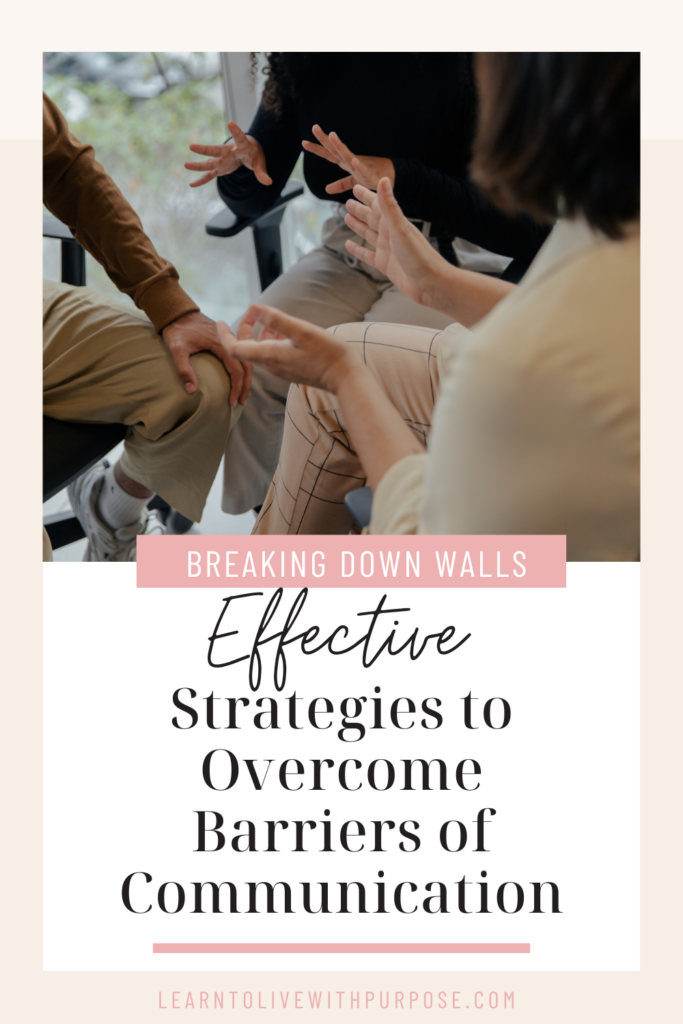
Communication is the lifeblood of relationships, both personal and professional. However, barriers to effective communication can hinder the exchange of ideas, lead to misunderstandings, and strain relationships. 🫠
In this comprehensive guide, we will explore common barriers to communication and provide practical strategies to overcome them.
Whether you’re navigating workplace dynamics, fostering better connections with friends and family, or seeking to improve your overall communication skills, these insights will help you break down the walls that impede effective communication. 🙂
Let’s get started!
Understanding Barriers to Communication:
1. Lack of Clarity and Precision:
One of the fundamental barriers to effective communication is a lack of clarity. Vague or imprecise messages can lead to confusion and misinterpretation. It’s essential to articulate your thoughts clearly, using precise language and providing relevant details to ensure your message is accurately received. 😊
2. Emotional Barriers:
Emotional barriers, such as stress, anxiety, or strong emotions, can impede communication. When individuals are emotionally charged, they may struggle to express themselves clearly or be receptive to others. Managing emotions and creating a calm environment are crucial for effective communication.

3. Cultural and Language Differences:
Cultural and language diversity can create barriers to communication. Differences in language proficiency, communication styles, and cultural norms may lead to misunderstandings.
To overcome this barrier, it’s essential to foster cultural awareness, be patient with language differences, and use clear and straightforward language. 😊
4. Noise and Distractions:
Physical and environmental factors, such as noise and distractions, can interfere with communication. Whether it’s background noise, technological disruptions, or a busy environment, minimising distractions enhances the clarity and effectiveness of communication. 👂

5. Assumptions and Stereotypes:
Preconceived assumptions and stereotypes can create barriers by influencing how we interpret messages. Avoid making assumptions about others’ perspectives or intentions. Instead, approach communication with an open mind, seeking to understand diverse viewpoints without judgment. 🧠
6. Lack of Feedback:
Communication is a two-way process, and the absence of feedback can be a significant barrier. Encourage open dialogue, actively seek input from others, and provide constructive feedback. Creating a feedback loop ensures that messages are received and understood and not going in one ear and out the other.

7. Poor Listening Skills:
Ineffective listening is a pervasive barrier to communication. When individuals fail to actively listen, they miss important details, leading to misunderstandings. Improving listening skills involves giving full attention, avoiding interruptions, and practicing empathy to understand the speaker’s perspective. 😊
8. Power Dynamics and Hierarchies:
Unequal power dynamics or hierarchies within relationships or organisations can stifle open communication. Those in lower positions may feel hesitant to express their thoughts or concerns. Fostering an inclusive and open communication culture helps overcome these power-related barriers. 🫂
Strategies to Overcome Communication Barriers:
1. Prioritise Clarity in Communication:
- Articulate Clearly: Use clear and concise language when conveying your message. Avoid jargon or overly complex terms that may confuse the listener.
- Provide Context: Offer relevant background information to ensure your message is fully understood. Context helps the listener connect the dots and interpret your message accurately.
- Encourage Clarification: Create an environment where others feel comfortable seeking clarification. Encouraging questions can help address potential misunderstandings. 🤗

2. Emotional Intelligence and Regulation:
- Self-Awareness: Develop an understanding of your own emotions. Recognise how emotions may impact your communication style and be mindful of potential emotional triggers.
- Empathy: Practice putting yourself in others’ shoes. Empathetic communication involves understanding others’ perspectives and responding with sensitivity.
- Stress Management: Learn effective stress management techniques, such as deep breathing or mindfulness, to regulate emotions during challenging conversations.
Want to learn more about emotional intelligence? Check out this blog here: How to practice emotional regulation – tips for adults on how to cope
3. Cultural Sensitivity Training:
- Cultural Awareness: Educate yourself about different cultures, communication styles, and customs. A culturally aware approach fosters understanding and respect.
- Language Simplification: In multilingual settings, use simple language and avoid idioms or slang that may not translate well. Visual aids can also help enhance understanding. 🤗
- Inclusivity: Create an inclusive environment that values and celebrates cultural diversity. Encourage open discussions about cultural differences to promote understanding.
4. Create a Distraction-Free Environment:
- Choose Appropriate Settings: Select quiet and conducive environments for important conversations. Minimse disruptions by choosing a location with minimal background noise.
- Digital Etiquette: In digital communication, turn off notifications and ensure a stable internet connection. This helps maintain focus during virtual meetings or discussions. 🧑💻
- Active Presence: Demonstrate active presence by giving your full attention to the speaker. Make eye contact and eliminate distractions to signal that you are fully engaged.

5. Challenge Assumptions and Stereotypes:
- Open-Mindedness: Approach conversations with an open mind, avoiding preconceived notions. Be willing to challenge your assumptions and consider alternative perspectives.
- Promote Diversity and Inclusion: Actively promote diversity and inclusion in your personal and professional spheres. Encourage dialogue that challenges stereotypes and fosters a culture of acceptance.
- Educate Others: Share information that challenges common stereotypes. Education is a powerful tool in breaking down barriers and promoting understanding. 📖
6. Establish a Feedback Culture:
- Encourage Open Dialogue: Foster an environment where open dialogue is encouraged. Create channels for constructive feedback and ensure that all team members feel comfortable expressing their opinions. 🗣️
- Regular Check-Ins: Conduct regular check-ins to gather feedback on communication processes. Identify areas for improvement and implement changes based on the feedback received.
- Model Constructive Feedback: Lead by example by providing constructive feedback. Demonstrating how to give and receive feedback creates a culture of continuous improvement.
7. Enhance Listening Skills:
- Active Listening Techniques: Practice active listening by giving your full attention to the speaker. Avoid interrupting and provide feedback to demonstrate that you are engaged.
- Paraphrasing: Paraphrase the speaker’s message to confirm understanding. This not only clarifies information but also signals to the speaker that you are actively processing their words. 💬
- Empathetic Listening: Cultivate empathetic listening by trying to understand the emotions behind the words. Consider the speaker’s perspective and respond with empathy.

GRAB YOURSELF OUR FREE SELF-CARE BUNDLE!
It’s time to take some time out for yourself love! Check out this four-page bundle of self-care goodness that you can use to relax, refresh and rejuvenate. You deserve it sis.
Pop your info in and download your bundle now ❤️
8. Promote Inclusive Communication:
- Equal Participation: Encourage equal participation in discussions, regardless of hierarchical positions. Create platforms where everyone has the opportunity to voice their opinions and ideas.
- Team-building Activities: Foster a sense of unity within the team through team-building activities. Shared experiences can break down barriers and create a more cohesive group.
- Leadership Modeling: Leaders should model inclusive communication. By demonstrating openness to diverse perspectives and ideas, leaders set the tone for an inclusive organisational culture. 🏬
Real-Life Applications:
1. Workplace Communication:
- Clear Communication Channels: Establish clear communication channels within the workplace. This includes well-defined reporting structures, open-door policies, and regular team meetings.
- Conflict Resolution Workshops: Conduct workshops on conflict resolution to equip employees with the skills needed to navigate disagreements effectively. Emphasise active listening and constructive feedback.👂
2. Personal Relationships:
- Quality Time: In personal relationships, allocate quality time for meaningful conversations. Create an environment where both partners feel comfortable expressing their thoughts and emotions.
- Shared Activities: Engage in shared activities to strengthen bonds. Activities that foster communication, such as cooking together or participating in a hobby, provide opportunities for connection. 👨👩👧
Do you want to know your partner better? Check out our Relationship Planner.
3. Conflict Resolution:
- Mediation Training: Provide mediation training for individuals involved in conflict resolution. Equipping team members with mediation skills enhances their ability to facilitate productive discussions. 🧘♀️
- Establishing Common Ground: Identify common ground during conflicts. Finding shared values or goals can serve as a foundation for resolution and create a more collaborative atmosphere.
Conclusion:
Effectively overcoming barriers to communication involves a multifaceted approach that integrates self-awareness, empathy, and a commitment to fostering an inclusive environment. By implementing these strategies in various aspects of our lives, we can dismantle communication barriers and pave the way for stronger connections, collaboration, and understanding. 🤗
As we actively apply these strategies, we contribute to creating a culture of effective communication—one where diverse perspectives are valued, feedback is embraced, and relationships thrive. Breaking down the walls that hinder communication is a transformative journey that leads to more meaningful connections and a more harmonious and connected world.
Pin this post for a reminder 📌 👇

Related Blog
Things to Say “No” to for you to Live a Happier Life
How to Stop Settling For Less Than You Deserve
How to Become the Best Version of Yourself: A Guide For 20-Somethings
In today’s fast-paced and ever-changing world, it’s more important than ever to invest in yourself.
With the constant demands placed upon us by work, family, and ourselves, it can be all too easy to neglect our own personal growth and development. 😑
However, the most successful and fulfilled individuals understand the importance of making self-investment a priority. In this blog, I’ll explore the top 10 ways you can invest in yourself to build a brighter future and unlock your full potential.
Let’s go! 🙌
Introduction to Investing in Yourself
Investing in yourself is about dedicating time, energy, and resources toward your personal growth and self-improvement. 😀
It’s about recognising your worth and understanding that the best investment you can make is in your own development. By prioritising self-investment, you’re not only enhancing your current skills and abilities but also preparing yourself for future opportunities and challenges.
In essence, investing in yourself is the key to unlocking a fulfilling and successful life. 💁♀️

Importance of Self-Investment for Personal Growth and Success
Self-investment is crucial for personal growth and success for several reasons.
First, it allows you to continually evolve and adapt to the changing world around you.
By actively seeking out new skills and knowledge, you’re able to stay ahead of the curve and remain competitive in your field. 🏆
Second, investing in yourself boosts your self-esteem and sense of self-worth. When you take the time to nurture your mind, body, and soul, you send a powerful message to yourself and the world that you are valuable, deserving, and capable of greatness. 💕
Finally, self-investment helps you to build resilience and navigate life’s inevitable setbacks with greater ease.
RELATED: You’re reading this blog because you’re big on personal growth and I love that for you! Are you ready to take it to the next level? Check out our Personal Growth Bundle!

The Power of Education and Lifelong Learning
One of the most effective ways to invest in yourself is through education and lifelong learning. By continually expanding your knowledge and skillset, you’re not only improving your current abilities but also preparing yourself for future opportunities and challenges. 🎯
P.s. Check out our range of courses here so you can do just the same.
This can be achieved in a variety of ways, such as taking classes, attending workshops, or enrolling in online courses. Additionally, don’t underestimate the power of self-directed learning through books, podcasts, and online resources. 📖
No matter how you choose to pursue education, the key is to remain curious and committed to your ongoing growth and development.
Building a Strong Professional Network
Another crucial aspect of self-investment is building a strong professional network.
Your network can provide invaluable support, guidance, and opportunities that can significantly impact your career trajectory. 📈
To build a robust network, make it a priority to attend industry events, conferences, and meetups.
Additionally, consider joining professional organisations or online forums related to your field. Finally, don’t forget the power of social media platforms such as LinkedIn, which can help you connect with like-minded individuals and stay informed about industry trends and job opportunities. 💼

Developing Essential Soft Skills
While technical skills are important, soft skills are equally crucial for personal and professional success. Soft skills, such as communication, leadership, problem-solving, and emotional intelligence, can help you navigate interpersonal relationships and stand out in the workplace. 🗣️
To develop these essential skills, consider participating in workshops, seminars, or online courses that focus on areas such as conflict resolution, negotiation, or effective communication. Don’t underestimate the power of practicing and honing these skills in your everyday life. 😌
Embracing a Healthy Lifestyle and Self-Care
Investing in your physical and mental well-being is a critical component of self-investment. By prioritising self-care and maintaining a healthy lifestyle, you’re not only improving your overall quality of life but also ensuring that you have the energy, focus, and resilience necessary to pursue your goals and aspirations.
This can include regular exercise, maintaining a nutritious diet, getting adequate sleep, and engaging in stress-reduction activities such as meditation, yoga, or mindfulness practices. 🥗
Remember, a healthy and balanced lifestyle is essential for long-term success and well-being.
P.S Check out our Health Bundle to find out more

Cultivating a Growth Mindset
A growth mindset is a belief that your abilities and intelligence can be developed through hard work, dedication, and perseverance.
By cultivating a growth mindset, you’re more likely to view challenges as opportunities for growth, embrace feedback, and maintain motivation in the face of setbacks. 😅
To develop this mindset, practice self-reflection and seek out opportunities to learn from your mistakes and failures. Additionally, surround yourself with positive influences and role models who embody the growth mindset and can provide support and encouragement.
Did anyone spring to mind when you read that? 🤔
Financial Investment in Personal Development
While many aspects of self-investment require time and effort, it’s also essential to consider the financial aspect of personal development. 👀
This can include investing in educational opportunities, professional certifications, or coaching and mentorship programs.
By allocating financial resources towards your growth and development, you’re not only reinforcing your commitment to self-improvement but also increasing your earning potential and career prospects. 💰
Remember, the return on investment from personal development can be invaluable in terms of personal fulfillment and financial success.
Are you ready to get your finances in order? Check out our finance bundle here 👇

Pursuing Hobbies and Passions
Investing in yourself also means dedicating time to your hobbies and passions. By engaging in activities you enjoy, you’re not only nurturing your creativity and expanding your skillset but also recharging your mind and promoting overall well-being.
Whether it’s painting, dancing, cooking, or writing, make it a priority to carve out time in your schedule to pursue your interests and cultivate joy in your life. 💕
Want to learn simple ways to love yourself? Check out this 10 simple ways to love yourself blog post!
Volunteering and Giving Back
Another powerful way to invest in yourself is by volunteering and giving back to your community. Not only does this provide a sense of purpose and fulfillment, but it can also help you develop new skills, forge meaningful connections, and gain valuable experiences.
Whether it’s through a local non-profit, a professional organisation, or an international volunteer program, seek out opportunities to make a positive impact and grow both personally and professionally. 💼
Conclusion: The Lifelong Benefits of Investing in Yourself
Investing in yourself is the key to unlocking a brighter future, filled with personal growth, success, and fulfillment.
By embracing education and lifelong learning, building a strong professional network, developing essential soft skills, maintaining a healthy lifestyle, cultivating a growth mindset, allocating financial resources towards personal development, pursuing hobbies and passions, and giving back through volunteering, you’re setting yourself up for a life of continuous growth and achievement. 🏆
Remember, you are your most valuable asset, and the investment you make in yourself today will pay dividends for years to come. ❤️
Pin this post for a reminder 📌 👇

Related Blogs
The Top 10 Reasons Why People Don’t Reach Success
Everyone has days when they feel like they’re doing really well and days when they don’t feel that way at all.
Sometimes the negative thoughts of you not doing well in life can come from witnessing milestones achieved by friends and family or a big birthday is coming up and you don’t understand where all the time has gone because you’re nowhere near completing the goals you gave yourself ages ago. 😔
It can be difficult to tell the difference between feeling good about where you are and actually doing well in life. That’s why it’s important to take a step back and reflect on the different aspects of your life to determine if you’re doing as well as you think. 🤔
Here are 10 encouraging signs that you’re doing well in life.
1. You Have a Strong Support System
Having a strong support system is one of the most important factors for a happy and successful life. Having a support system of family and friends who are there for you in times of need can make all the difference. 🥰
It’s also important to have people in your life who can offer advice and support when needed. Knowing that you have people who have your back can give you a sense of security and well-being.
Having a support system also means that you have people who you can turn to when times get tough. Knowing that you have someone to rely on can make all the difference in how you handle difficult situations.
Being able to talk to someone about your problems can often provide you with a different perspective and give you the motivation to keep going. 🙂
If you have a strong support system you are very fortunate, never forget that.

2. You Have a Sense of Self-Confidence
Self-confidence is an important factor in doing well in life. It’s important to be confident in yourself and your abilities.
When you have a positive belief in yourself, it can help you to push through difficult times and help you make the right decisions. 👊
Knowing that you have the skills and abilities to tackle any challenge can give you the courage to take on any task.
It’s also important to have a sense of self-worth. Being able to recognize your own value and worth can give you the motivation to strive for your version of success.
It’s also important to celebrate your achievements and recognise your accomplishments. Having a healthy sense of self-confidence can help you to be resilient in the face of adversity and make the most of every situation. 😄
3. You Have Good Mental Health
Good mental health is essential for doing well in life. It’s important to take care of your mental health and make sure that you are in a good place mentally. 🧠
Paying attention to your mental health can help you to cope with difficult situations and make better decisions.
It’s also important to make sure that you are getting enough rest, relaxation and alone time. 🛀
Rest, relaxation and alone time can help to reduce stress and give you a better outlook on life. Taking time for yourself to relax and recharge is essential for good mental health.
It’s also important to practice self-care and make sure that you are taking care of your physical and mental health.

4. You Have Goals and Dreams
Having goals and dreams is essential for doing well in life. Setting goals and having dreams can help to motivate and inspire you to keep going, even if things around you are falling apart. 😬
It’s also important to break down your goals into smaller, achievable steps. Breaking down your goals can make them seem more manageable and give you a sense of accomplishment when you reach each step.
Having a plan and a timeline helps you to keep on track and focused on achieving your goals.
RELATED: The How to set goals and achieve them mini-course

5. You Take Care of Your Body
Taking care of your body is an important part of your overall well-being. Taking care of your physical health can help to improve your mental health and make you feel better overall, making life that much better. 💪
Making sure that you are eating a healthy diet, getting enough exercise, and getting enough sleep are all essential for good physical and mental health.
Taking time to practice self-care and relaxation can help to reduce stress and make you feel better overall.
If you have access to things that make taking care of your body even easier ( gym membership, ability to cook fresh health meals) then good on you! 🥗
6. You Have a Positive Attitude
Having a positive attitude is essential for doing well in life. Having a positive outlook on life can help to keep you driven and inspired to keep going.
It’s also important to focus on the good things in life and not get bogged down by the negative. Being able to look for the silver lining in every situation can help to keep you in a positive frame of mind. 💭
It’s also important to practice gratitude and to be thankful for what you have. Being thankful for the good things in life can help to improve your outlook and make you feel more content.
As well as being able to practice self-compassion and to be kind to yourself. Taking time to recognise your own worth and value can help to boost your self-confidence and make you feel better overall. 😁

7. You Are Grateful for What You Have
Gratitude is an important factor in doing well in life. It’s important to be thankful for what you have and to recognise the good things in life that you may take for granted.
Taking time to appreciate the people in your life and the things that you have can help to boost your mood and make you feel better overall. 😌
It’s also important to practice gratitude for yourself and to be thankful for your own efforts and accomplishments.
Being able to recognise your own worth and value can help to boost your self-confidence and give you a better outlook on life.
Practicing gratitude can also help to reduce stress and make you feel more content. 😮💨
8. You Are Making Progress
Making progress is an important factor in doing well in life. It’s important to be able to realise that you are making progress and to celebrate small victories along the way.
Taking time to recognize your accomplishments and progress can help to motivate and inspire you to keep going.
It’s also important to recognize that progress takes time and that it’s not always a linear process. 📈
Taking time to reflect on the progress that you have made can help to give you a sense of accomplishment and make you feel better overall.
Remember to be patient and not to give up if you don’t see immediate results. Your time is coming sooner than you realise. 🙂
RELATED: What does success mean to you? Take our quiz here
9. You Are Making Connections
Knowing how to make connections is an important factor for doing well in life. Having a strong network of people who you can connect with can help to make life more enjoyable. 🌞
Having people who you can talk to and share experiences with can help make life more meaningful.
Making meaningful connections with people can help to make life more to ones liking and can give you a sense of purpose.
Taking time to get to know people and form strong relationships can help to improve your overall mood and make you feel better. 🤗
You can make more connections by networking through LinkedIn or utalising your friends networks. This will be especially useful if you’re looking for connections in regards to your career/business.

10. You Have a Positive Impact on Others
Having a positive impact on others is a great sign that you’re doing well in life. Being a positive influence on those around you can help to make life more enjoyable. 🤭
Taking time to help and support others can give you a sense of purpose and make you feel better overall.
It’s also important to aknowledge the positive impact that you have on others. Taking time to recognise the ways that you have helped and supported others can help to boost your self-confidence and make you feel better about yourself and your contributions.
Being able to realise the good that you do can help to make life more meaningful and give you a sense of accomplishment. 🏆
To Sum It Up
Doing well in life is not always easy and it’s important to take the time to reflect on different aspects of your life to determine if you’re doing as well as you think.
There are many encouraging signs that you’re doing well in life, from having a support system to having a positive attitude. 🥰
Taking time to recognise the good things in life can help to improve your overall well-being and make life more enjoyable.
Making sure that you are taking care of your physical and mental health and striving for progress can help to ensure that you’re doing well in life.
You’ve got this. ❤️
Pin this post for a reminder 📌 👇

Related Blogs
What is Self-Efficacy & Why is it Important
Why Intentional Living is The Best Thing You Can Do For Yourself
Do you ever wonder what it takes to achieve success? Many successful people share similar daily habits and routines that are integral to their success.
Having a daily routine can make us feel more in control of our lives and allows us to make time for the things that really important. People who tend to “wing” their day because they have no schedule to adhere to usually feel stressed, overwhelmed and uneasy.
No two people are the same and the habits of successful people are a mixed bag but there are some consistencies across the board and it’s those habits that are going to help you live a successful and fulfilled life.
Packing your day with these 10 daily habits will help you be more productive, feel more in control and put you on the right track on living your version of success.
“We are what we repeatedly do”
Now let’s get into the top 10 daily habits of successful people. 😊
This post contains affiliate links. Read my full disclosure policy here.
1. They wake up early
Waking up early gives you more time to work on yourself and your goals. When you’re picking the right time to wake up in the morning you have to factor in your current activities in both your personal life and professional life E.g. if you’re a constant flyer who is always jet-lagged, you’re going to find it extremely hard to consistently wake up at the same early hour every day. 😧
In order to wake up ready to go and take on the day it takes more than just setting an alarm and praying that your finger isn’t going to press the snooze button.
When you wake up every day at the same time your body becomes conditioned to that time and regulates your sleep patterns accordingly. Your body will actually start waking up before your alarm sounds off!
Here’s a couple of ideas to think about in order to make waking up earlier that little bit easier:
👉 Don’t make a drastic change in time at the beginning
If you usually wake up at 10am and you want to start waking up at 4:45am trying to do that straight away instead of cutting back gradually is setting yourself up for failure. Start slowly by putting your alarm 15-30 minutes earlier for a couple of days until you reach your goal time.

👉 Put your alarm clock far away from you
By far away I don’t mean out the room where you can’t hear it 😂 just put it far enough where you have to walk in order to turn it off, and if you share your bed with someone you could be more likely to run or walk briskly which is even better at keeping you awake. Once you’re up, stay up!
👉 Go to bed earlier
If you’re used to going bed late then you have to break that habit by entering a “wind-down” routine even when you don’t feel tired. Try reading, yoga or meditating to get you in a calm and relaxing state. Don’t forget that your general physical fitness greatly impacts your sleeping habits.
Tom Corley an Accountant and Financial Planner surveyed 233 wealthy individuals, mostly self-made millionaires about their daily habits.
Nearly 50% of the self-made millionaires in Corley’s research got out of bed at least 3 hours before their workday actually started. Many of them used this extra time to work on their own personal projects or exercise.
There is no better feeling than knowing everything you need to do for the day is already done because you accomplished everything you needed to do in those extra hours in the morning.
2. They plan their day
The first step of planning your day is to clearly define what you want to get out of it.
It’s best to plan your day the night before (preferably part of your evening routine) so you wake up knowing exactly what you have to do without any faff!
Nothing worse than waking up and going about your day to realise you haven’t done anything that you told yourself you would do.
Get organised!
Get yourself a planner and WRITE STUFF DOWN. Your brain has no interest in trying to remember everything you said over the past 24 hours. Your success is dependent on what you manage to get done day in and day out.
Imagine what you could achieve if you plan your day with only high leverage activities with no time-wasting whatsoever.
If you actually follow through with your daily plans not only will you hit your goals in a timely manner, you’ll achieve your version of success much faster.
RELATED: Ready to start planning out your day properly? Then check out the Goals & Planners Printable Bundle
3. They eat healthily and exercise
How many times has the thought “I’ll do it tomorrow” crossed your mind when it comes to eating healthy and exercising?
Probably more than a 100 times right? 😂
Having healthy habits such as eating healthily and exercising help your overall wellbeing and make you look and feel good.
These habits are hard to develop without changing your mindset first, but if you’re willing to make sacrifices to better your health the impact will be significant regardless of your age or physical ability.

4. They focus on high-leverage activities
High-leverage activities get you the results you need more effectively (less expenditure of time, money or energy).
It doesn’t matter how productive you think you are if you’re not producing results. Don’t waste your time it’s your most valuable asset.
Focusing on the activities in your day that produce the most valuable results will set you up for success.
Staying focused isn’t something that comes naturally to a lot of us, it requires a lot of willpower that must be practiced.
If you lack the discipline to control your focus eventually distractions will consume your precious time.
This point definitely had to be in my list of daily habits for successful people because you can be the most time-efficient, organised person in the world but if you’re not focusing on the right activities that are going to get you closer to your goals, you’re going to suffer.
Progression = Happiness ❤️
RELATED: Learn what your high-leverage activities are by gaining clarity on what you want out of your life by using our PERSONAL GROWTH BUNDLE
5. They surround themselves with positive people
Surrounding yourself with positive people with positive outlooks will create a better influence in your life. Think about the people who you spend the most time with and write down their qualities.
Are they lighting your fire or dowsing your flame? Think about how you feel when you are around them.
🤔 Do they support you and help you reach your goals?
🤔 Do they make you feel full of life when you’re with them?
🤔 Can you turn to them when you feel down?
🤔 Do you feel happy when you see their name pop up on your phone?
If you’re able to respond yes to the above questions, you’re probably surrounded by the people you need to be.
6. They Invest in self-care
It’s easy to push aside self-care in our busy lives or not make it a high priority. Self-care is any action or behaviour that individuals take for themselves to protect, maintain and improve their health and wellbeing.
Taking care of yourself daily is essential, it allows you to become the best version of yourself and therefore be better for the people around you. Here’s a list of daily self-care activities to consider for optimal performance:
✨ Exercise/Yoga
✨ Develop Morning, Afternoon & Evening routines
✨ Make sure you get enough sleep
✨ De-clutter
✨ Have a pamper day
✨ Laugh often
✨ Express gratitude
✨ Meditate

7. They never stop reading
You should never stop gaining knowledge, everything you read fills your head with new bits of information that can make you better equipped to tackle challenges.
Reading also improves your focus and concentration. The average person in a 5-minute time span will divide their time between texting, checking emails, scrolling through social media and interacting with people around them. 🤯
This lack of concentration causes stress levels to rise and definitely lowers your productivity. However, submerging yourself into a great book shuts off the outside world, only you and the book exists. Bliss. 😌
Heather’s Top Tip: You can’t remain at the same level of knowledge you have right now and expect your life to elevate to the next stage. Immerse yourself in books that are going to help you grow in the areas of your life that you wish to improve.
8. They look at their goals
Vividly describing your goals in written form is strongly associated with goal success.
Look at your goals every day, they are an important part of your life. Reminding yourself of your daily goals is an integral part of any successful routine because it allows us to analyse where we stand on a day-to-day basis.
Long-term goals are reinforced by our daily goals and milestones, which push us closer to our dreams. Take your time to reflect and adjust your daily goals accordingly to make sure that you’re still on track.
Get those goals down!

9. They laugh Often
Inevitably things are going to go wrong in life that there’s nothing you can do about. It’s your choice whether you dwell in misery or find the humour/positivity in situations.
Learn to laugh at yourself and not take things too seriously. 😂
The positive feeling you get after laughing remains with you even after the laughter subsides, and don’t forget that laughter is 100% contagious, just hearing someone laugh (especially if it’s a really weird laugh) readies your brain to smile and join in on the fun.
Yes, take things seriously when they need to be serious, but don’t miss out on the tiny joys in life. You’ll regret it.
10. They exercise positive self-talk
Every day is a fresh start, and everyday you should start off with a self-talk to remind yourself to “boss” the day.
Self-talk in the most powerful form of communication as it can either empower you or defeat you internally.
What you say to yourself determines how you feel about yourself. Imagine looking at yourself in the mirror repeatedly saying positive things about yourself and positive thoughts for the day.
You won’t be able to help but smile or even possibly laugh which I’m definitely guilty of (whenever I smile to myself I always end up laughing for some odd reason).
You’ll feel a sense of empowerment and confidence that you’re ready to take on the world, and that’s because you can. 💪
I really hope you enjoyed reading these 10 daily habits of successful people! Let me know in the comments which ones you do. (I’m very intrigued)
Pin this post for a reminder 📌 👇

Related Blogs
How to find and live your purpose in life
Did you know that people on my email list sometimes get exclusive discounts on my products? Join the community and save yourself some coins!
Freshly-squeezed inspiration, and no-nonsense tips + tricks to improve your life delivered to your inbox weekly.
Subscribe to my newsletter
Subscribe
You're all signed up!
Be sure to whitelist our email address so that all the goodies make it to your inbox.


